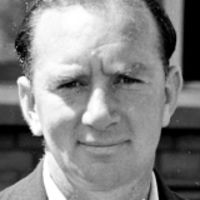Arthur McIntyre
England

INTL CAREER: 1950 - 1955
Full Name
Arthur John William McIntyre
Born
May 14, 1918, Kennington, London
Died
December 26, 2009 (aged 91y 226d)
Batting Style
Right hand Bat
Bowling Style
Legbreak
Fielding Position
Wicketkeeper
A Surrey man through and through - he was born within sight of The Oval - Arthur McIntyre was Surrey's wicketkeeper during perhaps their finest period when they won seven back-to-back championships in the 1950s. Originally a legbreak bowler (he was proud of his four first-class wickets) he was asked to fill in as keeper in an emergency, and showed such aptitude for the task that he soon became Surrey's first choice. McIntyre debuted for Surrey just before the Second World War, and had the misfortune to lose what might have been his best years in the early 1940s. He was 28 when the war ended, and rapidly became established as a wicketkeeper of the highest class. He was especially effective standing up to Alec Bedser, making some spectacular stumpings as well as missing little from the edge. His path to Test honours, however was blocked by Evans, and he played for England just three times. In fact for his one Test against Australia he was drafted into the side as an extra bat, Evans retaining the gloves. In a bizarre Test played on an appalling wicket, he had little chance to shine, particularly when he was called for an impossible fourth run by Evans in the second innings. If McIntyre were ever to replace Evans it would have needed to be on the strength of his batting, and he was never able to impress, failing to reach double figures in his three Tests (he was also unlucky in that England lost all three by substantial margins). He was a more than useful bat for Surrey with seven first-class centuries, and made 1000 runs in the English season three times. When he retired he had an impressive 795 victims as a keeper, and had seen Surrey go from strength to strength. He retained his association with Surrey for a further 20 years as coach, finally retiring in 1978, leaving an indelible impression on generations of young Surrey players.
David Liverman
Terms of Use|Privacy Policy|Your US State Privacy Rights|Children's Online Privacy Policy|Interest - Based Ads|Do Not Sell or Share My Personal Information|Feedback
© 2024 ESPN Sports Media Ltd. All rights reserved